As Jimmy Carter celebrates his 99th birthday on October 1, 2023, people across Georgia are reflecting on his impact on the region, the nation, and beyond. The following excerpts are taken from author and archivist Kaye Minchew’s Jimmy Carter: Citizen of the South, which explores Carter’s remarkable legacy and showcases the ways he shaped and was shaped by our state.
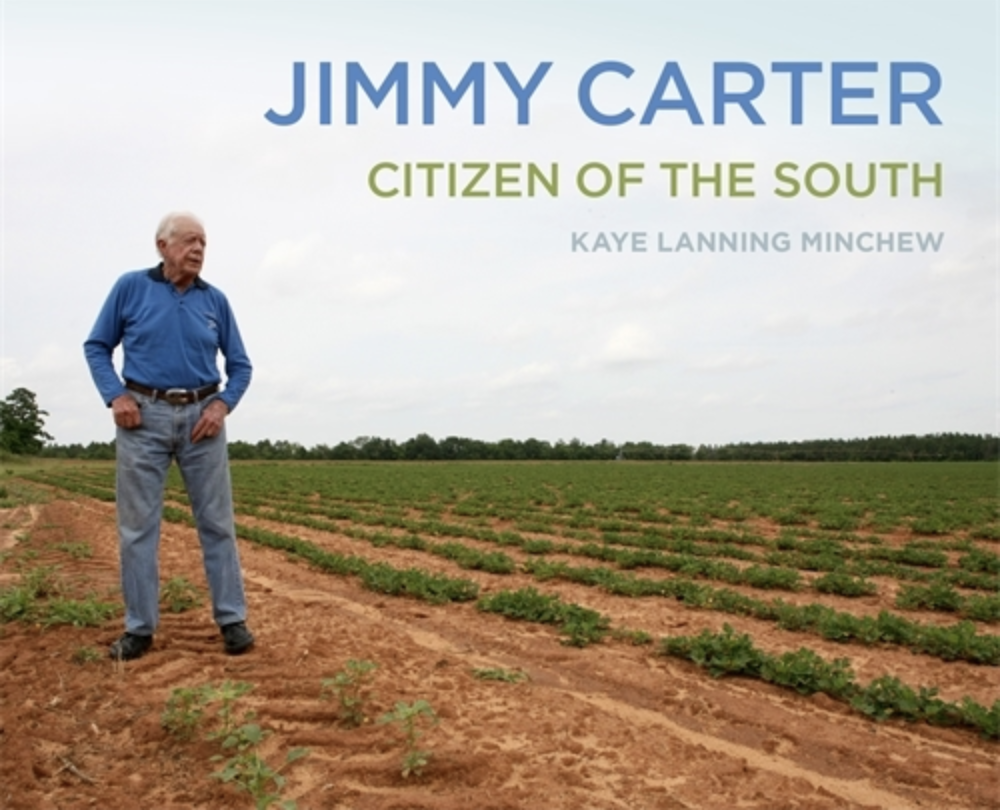
Cover of Jimmy Carter: Citizen of the South by Kaye Minchew
“In a few days, I will lay down my official responsibilities in this office–to take up once more the only title in our democracy superior to that of president, the title of citizen.”
With those words, Jimmy Carter, the 39th president of the United States, began his farewell address to the nation. That night, January 14, 1981, six days before Ronald Reagan took office, many expected Jimmy and Rosalynn Carter to disappear into the sunset, only to be heard from on occasional anniversaries. Indeed, the Carters themselves did not know what the future held for them. Jimmy had spent most of the last twenty years running for office and serving the people of Georgia and the United States. Decades later, many people agree that he is one of the best former presidents ever and that he used the office of the presidency as a stepping stone to even greater things.
Georgia and the South nurtured Jimmy Carter, provided a place to heal after his election defeats in 1966 and 1980, and offered a base for him to grow and move in directions he never expected. The importance of the red clay in his veins and the southern drawl in his voice cannot be overstated, as they combined with his character as a principled man throughout his life.
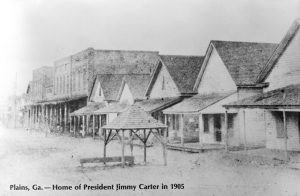
Courtesy of Georgia Archives
James Earl “Jimmy” Carter Jr. was born in Plains on October 1, 1924. This unlikely man who became president of the United States called rural southwest Georgia home all his life. Except for his time in the Navy and the White House, Carter spent his life in Georgia. Growing up in a rural southwest community, he developed a strong work ethic and a sense of responsibility that would guide him throughout his life.
Carter attended the Georgia Southwestern College and the Georgia Institute of Technology before graduating from the United States Naval Academy in 1946. His humble beginnings in Georgia and time in the military would provide the foundation for his commitment to public service and improving life in his home state.
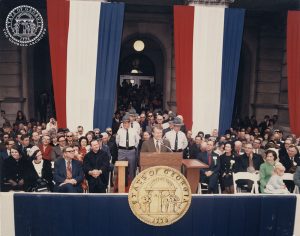
Courtesy of Georgia Archives
Carter’s political career began in Georgia when he was elected to the Georgia State Senate in 1962. His dedication to public service would next lead him to run for Governor. Recognizing that many Georgia voters had trouble accepting the racial changes of the 1960s, Carter employed different positions on civil rights issues at various times during his campaign. His pragmatism and more conservative stance–at times aligning himself with segregationists–helped him win the election. He then took an unexpected stance during his inaugural address as governor on January 12, 1971, proclaiming: “I say to you quite frankly that the time for racial discrimination is over…We who are strong or in positions of leadership must realize the responsibility for marking correct decisions in the future is ours.”
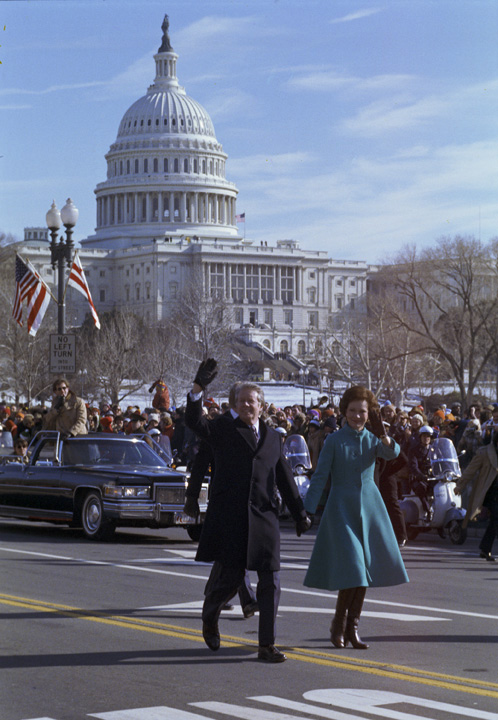
Courtesy of the Jimmy Carter Presidential Library and Museum
In 1976, Carter was elected as the 39th President of the United States. People from Georgia were some of the closest advisors and supporters of the Carters on the campaign trail. The Peanut Brigade, volunteers from Georgia who went to New Hampshire, Iowa, and elsewhere, helped Carter win the Democratic nomination in 1975. The “Georgia Mafia,” as the press named it, included a tight group of aides who worked with Governor Carter, plus others who joined the administration in Washington.
People from the South strongly supported Carter, with all southern states except Virginia going to him. When he took office in January 1977, Carter became the first person elected to the presidency from the Deep South since 1848.
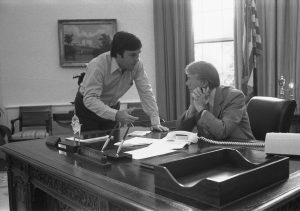
Jimmy Carter and Hamilton Jordan in the Oval Office, courtesy of the Jimmy Carter Presidential Library and Museum
During his presidency, Carter focused on addressing domestic energy, environmental, and education issues, as well as promoting human rights and fostering peace abroad. But his term was marked by various challenges, including economic stagnation, high unemployment, inflation, and the hostage crisis in Iran, that ultimately cost him reelection. Despite facing significant challenges during his term, Carter’s accomplishments included the Camp David Accords, the Panama Canal Treaty, the SALT II treaty with the Soviet Union, and the establishment of the Departments of Energy and Education.
Before the 1980 election, Jimmy and Rosalynn had never discussed what they would do if Carter lost. But soon after, they agreed to return to their home in Plains to settle financial issues related to the family peanut warehouse business that had been placed in a blind trust after the 1976 election. Despite the election loss, Carter kept busy during his lame duck session, signing Superfund legislation and the Alaska National Interest Lands Conservation Act, protecting over 150 million acres of land in our northernmost state.
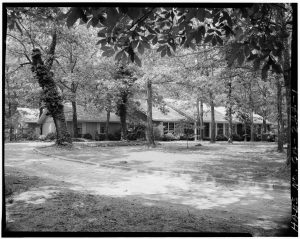
Courtesy of the Library of Congress
In 1981, the Carters returned to the only home they have ever owned, at 209 Woodlawn Avenue in Plains. After leaving office, Carter continued to serve his country and the world through various humanitarian efforts. Within weeks of leaving his office, Carter accepted an appointment as university distinguished professor at Emory. And in 1982, he established the Carter Center in Atlanta, a nonprofit organization dedicated to promoting global peace, health, and democracy. The Carter Center has played a significant role in addressing global health issues, promoting fair elections, and working toward peace in conflict-ridden areas. In 2002, Carter was awarded the Nobel Peace Prize–making him the second Georgian to receive the honor—for helping bring about the Camp David Accords and, more importantly, the extensive work he had done after his time in office to advance international peace and human rights.
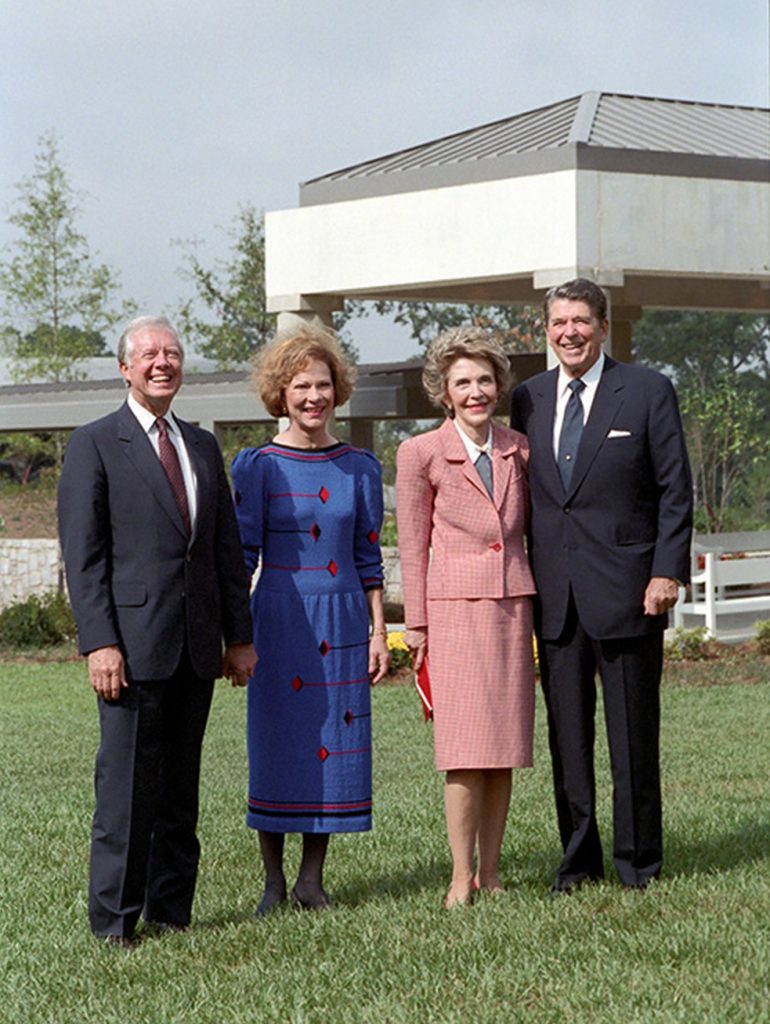
Jimmy and Rosalynn Carter with Ronald and Nancy Reagan at the dedication of the Carter Presidential Library in Atlanta, courtesy of the Ronald Reagan Presidential Library
During his early post-presidency years, Jimmy Carter also returned to his longtime love of teaching Sunday school at Maranatha Baptist Church, a calling he would continue for more than four decades. He and Rosalynn also became the best-known volunteers with Habitat for Humanity, a global nonprofit organization that started in Americus.
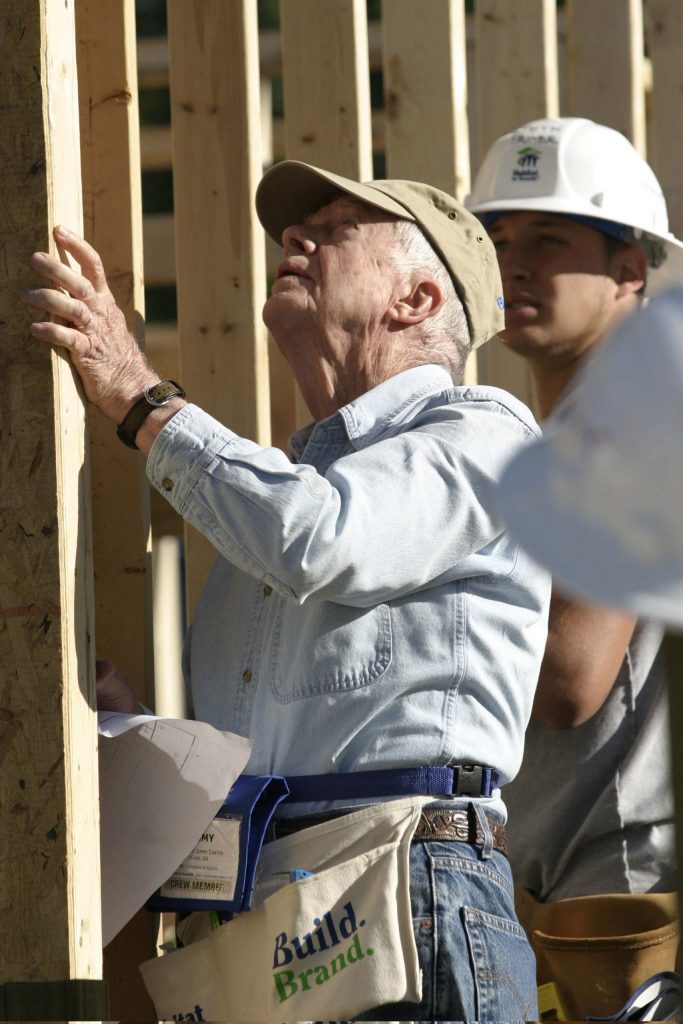
President Carter works with volunteers for Habitat for Humanity.
Except for his time in the navy and the White House, Carter has spent his life in Georgia. He worked and traveled throughout the world but, time and again, Carter returned to his home in Georgia and the South. Plains served as an anchor throughout his life. After he and Rosalynn returned to their tiny hometown in 1981, the people of Georgia and the South welcomed them with open arms and supported their activities.
The only Georgian to be elected president, Jimmy Carter helped restore respect to the office. He had been an honorable man who worked diligently to extend peace and human rights around the world. He had worked hard for the American people and told them the truth. After his self-declared “involuntary retirement” from the office, Carter redefined what it means to be an active and exemplary former president. He showed the world how a moral leader can act while proudly wearing the title of citizen of the South.
This text is excerpted from Kaye Minchew’s “Jimmy Carter: Citizen of the South,” a publication of UGA Press in association with Georgia Humanities. Learn more »

